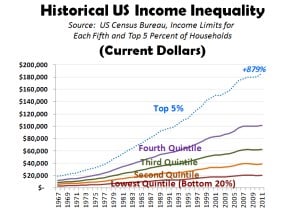Join our team of experienced tax professionals at R&G Brenner! We're hiring CPAs, EAs, office managers, assistants, and building maintenance staff. Apply now for exciting opportunities in tax and accounting services.
Which States Are Toughest on the Average American Taxpayer?
 Let’s face it: income inequality exists. However, local and state taxes have a big role to play in the redistribution of wealth. Some states have less stringent tax policies than other states—a relief to many taxpayers who would otherwise have to tithe their income to Uncle Sam. However, many state tax systems are considered regressive, with negative impacts on certain residents. So which states are toughest for the average American taxpayer?
Let’s face it: income inequality exists. However, local and state taxes have a big role to play in the redistribution of wealth. Some states have less stringent tax policies than other states—a relief to many taxpayers who would otherwise have to tithe their income to Uncle Sam. However, many state tax systems are considered regressive, with negative impacts on certain residents. So which states are toughest for the average American taxpayer?
Rich vs. Poor
The gap between rich and poor in this country continues to grow. According to 24/7 Wall Street, the wealthiest 20 percent of Americans had more income than the bottom 80% combined as of 2013. In addition, the average tax rate nationwide for the poorest 20 percent of people was at about 10 percent, which is twice the five percent rate for the top one percent of earners. While all states employ a regressive tax system, where the poor are taxed disproportionately more heavily than the rich, the difference in tax rates among various income brackets can vary between them all.
The Toughest States
It seems Washington is the top state with the most unfair tax system for average Americans based on its index score—a result of measuring inequality in income—totaling -12.6 percent, the worst in the whole country. In the Evergreen State, the poorest 20 percent shelled out about 17 percent of their income in combined taxes, while the richest one percent paid only 2.4 percent. This state’s tax code is considered unjust by many, despite the fact that its residents are doing okay for themselves compared with residents of other states.
The second toughest state for taxpayers is Florida, with an index score of -9.5 percent. Tax systems that benefit the richest people living there are only exacerbated by the fact that there is no state income tax. Texas also ranks poorly, with an index score of -8.5 percent. There is no tax on corporate profits, and while oil and gas is a huge industry that infuses a lot of income into the Lone Star state, low-income residents are not afforded any beneficial tax credits.
Top 10 Offenders
As stated above, Washington, Florida and Texas are some of the top offenders when it comes to regressive tax systems. Other states in the top 10 include South Dakota, Tennessee, Illinois, Arizona, Nevada, Pennsylvania, and Alabama. Within these states, taxpayers in the bottom 20 percent of the income scale must shell out in some cases up to six times as much in taxes as the wealthy do, according to the Institute on Taxation and Economic Policy, while the middle class pay up to three times as much as the rich.
Part of what makes many of these states regressive is the fact that they don’t levy personal income taxes that are broad enough to be considered fair. In those states that do have income taxes, the way they’re set up disproportionately burden the lowest earners compared with states with more progressive tax policies, such as Vermont, which has low sales and excise taxes, plus it offers tax credits for those who need them most.
It’s clear from this research that not all states’ tax systems are created equal—an issue local and state lawmakers may want to examine more closely.









